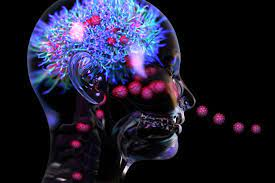EXPERTS IDENTIFY THE REASONS OF WEARINESS FOLLOWING A COVID INFECTION.
According to a study, post-Covid tiredness patients' neural systems were shown to be underactive in several crucial locations, raising the likelihood of fatigue, one of the most prevalent long-Covid symptoms. persons experiencing post-Covid tiredness underwent a series of behavioral and neurophysiologic tests, and their results were compared to those of persons who were not fatigued, by a team from Newcastle University in the UK.
The researchers found that
individuals with post-Covid tiredness displayed under activity in three distinct
neural system regions.
They discovered slower
reaction times in particular brain regions due to under activity in particular
cortical circuits; additionally, they discovered an imbalance in the autonomic
nervous system, the network of nerves that controls unconscious bodily
functions like blood pressure and breathing rate. This may have a wide range of
effects on several bodily functions. Additionally, they discovered anomalies in
the muscles, as the muscular fibres were more readily worn down after activity
in those with post-Covid
.
"These abnormalities in
the results of objective tests show that fatigue in long-term COVID is a
measurable disease, and these tests may, in time, help us understand how
changes in the nervous system contribute to fatigue," said Dr Demetris
Soteropoulos, Senior Lecturer in Motor Systems Neuroscience at the University.
In Brain Communications, the
study was published. A collection of reputable non-invasive
behavioural and neurophysiologic tests were performed on a group of 37
volunteers who had post-Covid tiredness. Their outcomes were contrasted with 52
controls who conducted the same tests and were matched for age and sex. A
startle reaction time test, an electrocardiogram, and transcranial magnetic
stimulation were among the tests that produced 33 sets of data.
In light of these findings,
the researchers will now start investigating whether the autonomic nervous system
may be controlled to alleviate post-Covid tiredness symptoms.
Natalie explained, "We're looking at a non-invasive technique that involves clipping an earpiece to the tragus on the ear and using a TENS machine to deliver small electrical currents to the vagus nerve -- familiar to many through its use for pain relief during childbirth." By assessing blood indicators of inflammation linked to exhaustion in different illnesses and, more crucially, whether the medication improves fatigue symptoms, the research will assess the treatment's benefits. Millions of individuals have been impacted by the COVID-19 epidemic throughout the world, and many of those who contracted the virus have said they felt worn out or exhausted for a while after recovering. There are several causes for the fatigue that comes after a COVID infection.
First of all, the virus can harm several bodily organs and systems, which lowers overall energy levels. persistent illnesses like heart disease or lung scarring that cause persistent tiredness can be brought on by this harm. Second, fatigue may also result from the immune system's defence against the pathogen. To combat the virus, the immune system of the body is stimulated, and this can be physically taxing for the body. The immune system may remain hyperactive even after the infection has been eradicated, which can cause persistent weariness.
Thirdly, the pandemic's
emotional toll may also make people feel worn out. The pandemic's social
isolation and economic instability, as well as the stress and fear of
contracting a potentially fatal virus, can hurt a person's
mental health and general level of energy.
Last, but not least, it's
important to remember that fatigue can also be a sign of mental health issues
like sadness or anxiety, which can develop or get worse both during and after a
COVID infection. These underlying problems can be addressed with the use of
medical care and assistance.













Comments
Post a Comment